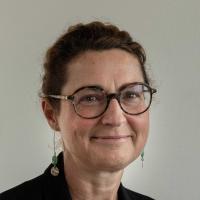
Reading time 5 min
Sustainable agricultural and forestry systems: a new focus for Anne Varet
Anne Varet has joined INRAE as its Scientific Director of Environment and Forest. Ms Varet comes to INRAE from the French Agency for Ecological Transition (ADEME), where she was Executive Director for Research and Foresight. She is excited to take up her new role, which is focused on guiding change across the institute’s activities in line with INRAE’s 2030 roadmap and with a special focus on interaction and feedback between climate, biodiversity, natural resources and risks.
Published on 01 September 2025
An engineer in agronomy with a doctorate in the sciences, Anne Varet began her career in fundamental and, later, applied research before moving on to strategic project management and monitoring roles. She joined INRAE on 1 September 2025.
A new Scientific Director of Environment and Forest for INRAE
In a world of closely interdependent transitions in demographics, food, energy and the climate, together with the need to use science to inform public policy, connect socio-economic stakeholders and engage with society on these issues, for Anne Varet, the Environment and Forest Directorate is a vital tool in developing ideas and solutions based on the best scientific knowledge. To do so, Ms Varet will ensure, with the support of the Environment and Forest Directorate’s team, that research conducted at the institute will help enhance the sustainability of agricultural and forestry production systems and the use of natural resources. This research must also help the world’s regions build resilience to climate change and risks stemming from global change.
This approach to the environment is part of INRAE's scientific strategy which Anne Varet will help coordinate during her four-year term.
Since agriculture, food, the bioeconomy and the environment are all part of the same system, Anne Varet will naturally work with INRAE’s two other scientific directorates – "Agriculture" and "Food and the Bioeconomy" – to advance agroecological transitions and multi-performance agriculture. She will also work closely with INRAE’s scientific divisions and with the deputy director general of science and innovation, under the supervision of the CEO of INRAE.
A career focused on ecological transition and the environment
Anne Varet began her career in project management and coordination in 2003 in the wood and forestry sector, where environmental considerations are increasingly important. She first worked for the non-profit Forêt Cellulose and later for the Institut technologique Forêt Cellulose Bois Construction Ameublement. In 2011 she had the opportunity to join the French Agency for Ecological Transition (ADEME). While there, Ms Varet led cross-disciplinary research and foresight on the challenges involved in the ecological transition, including resource management, energy challenges, environmental health and the human and social sciences. This experience expanded her expertise and her ability to wield the latter as a tool in public decision-making.
Anne Varet has come full circle with her return to research today, driven by a commitment to ensuring that research advances society and provides ideas and solutions for socio-economic decision-makers and stakeholders.
It is a great pleasure and exciting endeavour to help guide and galvanize research with the aim of finding solutions for public policy and society as a whole to tackle the major challenge of climate change and its impact on other transitions.
iN BRIEF
52 years old
- Career
Since September 2025: Scientific Director of Environment and Forest INRAE
2011-2025: French Agency for Ecological Transition (ADEME)
Scientific Director and Executive Director for Research and Foresight
Scientific Director and Deputy Executive Director for Research and Foresight
Deputy Executive Director for Strategy, Research and International Relations
Director, Research and Foresight
2008-2010: Director, Innovation and Research for the Institut technologique Forêt Cellulose Bois-Construction Ameublement (FCBA)
2003-2007: Association Forêt Cellulose (AFOCEL)
Director, Innovation and Research
Scientific Coordinator
- Education
2012: Executive seminar programme in sustainable development, Ministry of Ecology
2009-2010: Auditor, Institut des Hautes Études pour la Science et la Technologie (IHEST)
2002: PhD in Basic and Applied Biological Sciences (plant pathology, agricultural zoology, crop and forest protection) (Institut national agronomique Paris-Grignon)
1997: Five-year engineering degree in biology, diversity and crop adaptation (INA PG and Université Paris VI)
- Expertise
Member of:
Board of Directors of Arts et Metiers Paris Tech
Scientific Board of IMT (L’Institut Mines-Télécom)
Scientific Board of École nationale des ponts et chaussées
Scientific and Technical Board of CEREMA (Centre d'études et d'expertise sur les risques, l'environnement, la mobilité et l'aménagement)
